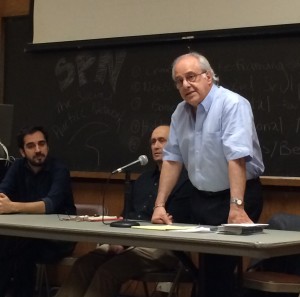 On May 6, as part of the Development Thought and Policy series, Professor Richard Wolff addressed a captive audience watching in person and online. His message: “what is happening in global capitalism and where it’s going is something to become very worried about.” Although the event was ostensibly centered on the Greek debt crisis and resulting austerity, his argument was much wider reaching. From Detroit to Athens to Berlin, the picture he painted was grim: rising consumer debt, stagnant real wages, and the decoupling of capitalism from its native locales. In order to prevent future default, argued Professor Wolff, western European banks and their governments are being extraordinarily harsh on Greek debtors, with the true price being paid by the Greek people: in January the Guardian reported that 200,000 young Greeks had left the country in search of work.
On May 6, as part of the Development Thought and Policy series, Professor Richard Wolff addressed a captive audience watching in person and online. His message: “what is happening in global capitalism and where it’s going is something to become very worried about.” Although the event was ostensibly centered on the Greek debt crisis and resulting austerity, his argument was much wider reaching. From Detroit to Athens to Berlin, the picture he painted was grim: rising consumer debt, stagnant real wages, and the decoupling of capitalism from its native locales. In order to prevent future default, argued Professor Wolff, western European banks and their governments are being extraordinarily harsh on Greek debtors, with the true price being paid by the Greek people: in January the Guardian reported that 200,000 young Greeks had left the country in search of work.
The event was organized by Achilles Kallergis, a PhD candidate at GPIA, and was also commented on by Professor Barry Herman, a noted expert on matters of foreign debt. There was some disagreement as to the nature of the debt, with Professor Herman pointing out that “there has been a lot of lying” within Greek politics as to the debt’s origin and composition. But Professor Wolff argued that both sides have been disingenuous, with French and German creditors portraying the Greek people as lazy, and themselves as more benevolent: “[the bailout] is to be presented as if it is helping the Greek people, which it isn’t.”
Nor is this an isolated incident, to hear Professor Wolff tell it. In industrial cities across the United States, debt processes are playing out in a very similar fashion to the Greek case. Capital has moved to cheaper countries, the expected quality of life is no longer affordable for an average citizen, and both consumers and governments have tried to maintain the Greek/American dream by “borrowing their way to it”. The main difference, as Professor Herman was quick to point out, is that Detroit was able to go to court with its creditors, and both had to accept a portion of the blame. For Greece there is no such option, and its citizens are forced to accept the burden.
The video of the event is embedded below, with Professor Wolff’s lecture lasting for approximately an hour, followed by commentary and questions.
Development Thought & Policy @ The New School is a multidisciplinary seminar series that brings to the fore contemporary research and policy proposals for development that is quitable and human centered. It aims to promote quality discussion amongst knowledgeable faculty and students on diverse approaches to development.



